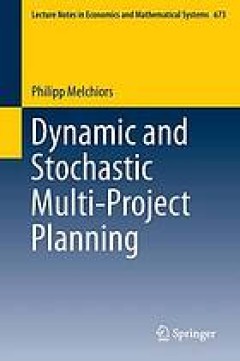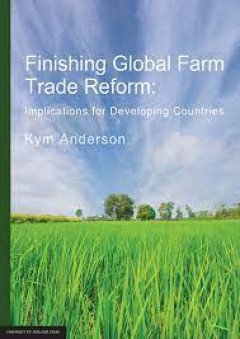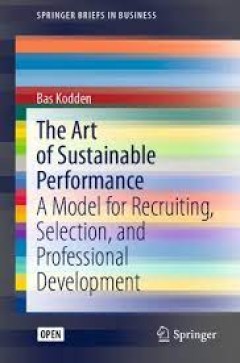Filter by

Human Interface and the Management of Information. Information and Knowledge …
The two-volume set LNCS 9172 and 9173 constitutes the refereed proceedings of the Human Interface and the Management of Information thematic track, held as part of the 17th International Conference on Human-Computer Interaction, HCII 2015, held in Los Angeles, CA, USA, in August 2015, jointly with 15 other thematically similar conferences. The total of 1462 papers and 246 posters presented at t…
- Edition
- -
- ISBN/ISSN
- 978-3-319-20611-0
- Collation
- XXV, 693
- Series Title
- -
- Call Number
- 004 HUM

Dynamic and stochastic multi-project planning
This book deals with dynamic and stochastic methods for multi-project planning. Based on the idea of using queueing networks for the analysis of dynamic-stochastic multi-project environments this book addresses two problems: detailed scheduling of project activities, and integrated order acceptance and capacity planning. In an extensive simulation study, the book thoroughly investigates existin…
- Edition
- -
- ISBN/ISSN
- 9783319045405
- Collation
- -
- Series Title
- -
- Call Number
- 658.5

Dynamical systems on 2- and 3-Manifolds
This book provides an introduction to the topological classification of smooth structurally stable diffeomorphisms on closed orientable 2- and 3-manifolds. The topological classification is one of the main problems of the theory of dynamical systems and the results presented in this book are mostly for dynamical systems satisfying Smale's Axiom A. The main results on the topological classificat…
- Edition
- -
- ISBN/ISSN
- 9783319448473
- Collation
- -
- Series Title
- -
- Call Number
- 515.353

Dynamical systems : modelling: Łódź, Poland, December 7-10, 2015
The book is a collection of contributions devoted to analytical, numerical and experimental techniques of dynamical systems, presented at the international conference "Dynamical Systems: Theory and Applications," held in Łódź, Poland on December 7-10, 2015. The studies give deep insight into new perspectives in analysis, simulation, and optimization of dynamical systems, emphasizing direct…
- Edition
- -
- ISBN/ISSN
- 9783319424026
- Collation
- xiv, 446 pages
- Series Title
- -
- Call Number
- 515.39

Dynamical Systems: Theoretical and Experimental Analysis
The book is the second volume of a collection of contributions devoted to analytical, numerical and experimental techniques of dynamical systems, presented at the international conference "Dynamical Systems: Theory and Applications, " held in Łódź, Poland on December 7-10, 2015. The studies give deep insight into new perspectives in analysis, simulation, and optimization of dynamical syste…
- Edition
- -
- ISBN/ISSN
- 9783319424088
- Collation
- xiv, 421 pages
- Series Title
- -
- Call Number
- 515.35

Advances in Crowdfunding : Research and Practice
This open access book presents a comprehensive and up-to-date collection of knowledge on the state of crowdfunding research and practice. It considers crowdfunding models and their different manifestations across a variety of geographies and sectors, and explores the perspectives of fundraisers, backers, platforms, and regulators. Gathering insights from a wide range of influential researchers …
- Edition
- -
- ISBN/ISSN
- 978-3-030-46309-0
- Collation
- -
- Series Title
- -
- Call Number
- 658 ADV

Finishing Global Farm Trade Reform: Implications for developing countries
This study reviews policy developments in recent years and, in the light of that, explores ways in which further consensus might be reached among WTO members to reduce farm trade distortions — and thereby also progress the multilateral trade reform agenda. Particular attention is given to ways that would boost well-being in developing countries, especially for those food-insecure households s…
- Edition
- -
- ISBN/ISSN
- 978-1-925261-35-6
- Collation
- -
- Series Title
- -
- Call Number
- 330 AND f

Dynamics of big Internet industry groups and future trends : a view from epig…
This book applies a new analytical framework to the study of the evolution of large Internet companies such as Apple, Google, Microsoft, Facebook, Amazon and Samsung. It sheds light on the dynamics of business groups, which are approached as 'business ecosystems, ' and introduces the concept of Epigenetic Economic Dynamics (EED), which is defined as the study of the epigenetic dynamics generate…
- Edition
- -
- ISBN/ISSN
- 9783319311470
- Collation
- XXV, 254 pages
- Series Title
- -
- Call Number
- 338.7

Human Aspects of IT for the Aged Population. Design for Everyday Life
The two LNCS volume set 9193-9194 constitutes the refereed proceedings of the First International Conference on Human Aspects of IT for the Aged Population, ITAP 2015, held as part of the 17th International Conference on Human-Computer Interaction, HCII 2015, held in Los Angeles, CA, USA, in August 2015, jointly with 15 other thematically conferences. The total of 1462 papers and 246 posters pr…
- Edition
- -
- ISBN/ISSN
- 978-3-319-20912-8
- Collation
- XXIII, 544
- Series Title
- -
- Call Number
- 004 HUM

The Art of Sustainable Performance : A Model for Recruiting, Selection, and P…
This open access book revisits common notions on how to select and recruit the right employees. It reveals that the secret of successful individuals and teams lies in a combination of talent and four important performance indicators, offering an innovative approach that companies can fruitfully adopt. Bas Kodden has studied key performance indicators among over 1,100 executives, senior staff an…
- Edition
- -
- ISBN/ISSN
- 978-3-030-46463-9
- Collation
- -
- Series Title
- -
- Call Number
- 658 BAS a
 Computer Science, Information & General Works
Computer Science, Information & General Works  Philosophy & Psychology
Philosophy & Psychology  Religion
Religion  Social Sciences
Social Sciences  Language
Language  Pure Science
Pure Science  Applied Sciences
Applied Sciences  Art & Recreation
Art & Recreation  Literature
Literature  History & Geography
History & Geography